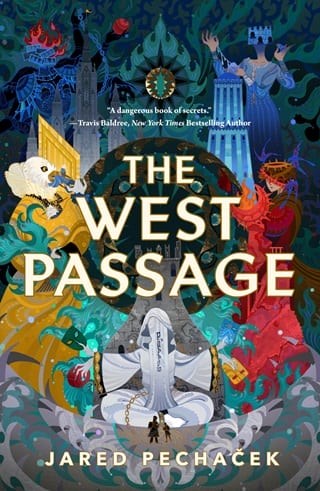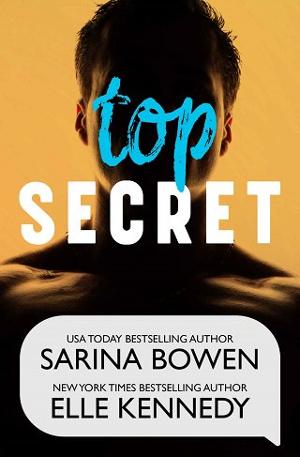17. Yarrow Remains Calm in the Face of Revelation and Peregrine Arrives
17. Yarrow Remains Calm in the Face of Revelation and Peregrine Arrives
If there was one thing Yarrow knew how to do, it was to resume her duties. She helped in the kitchen and schoolroom, gathered up Jasper's eggs as needed, dusted and swept. Two or three days passed. She did not visit the painted room again.
She should never have gone in. The Lady chained to the creature returned in her dreams. Sometimes she was the Lady, sometimes the creature, sometimes a small girl again, clinging to the skirts of an adult as something horrible happened. Yellow Tower almost ceased to frighten her: the real fear lay behind, at home. For though the fresco had not been true to life in many respects (the veiled Lady was from the Lily Era, as everyone knew), the guardians existed for a reason. Arnica and Old Yarrow had said as much: The evil that comes through the Passage . But they hadn't said where it came from. Whether they had suspected it, Yarrow didn't know, but she now believed that under Grey something ancient and awful was captive. She was, as we know, perfectly right.
She awakened from nightmares so many times that at last she determined to tell Jasper. He would be angry, of course, and might even banish her from the Last Schoolhouse, but Yarrow had been raised to confess. It would help if she spoke.
His face turned quite purple when she did.
"You what?" he said. And again, "You what ?," slamming his staff into the floor as punctuation to his outrage.
"I am sorry," said Yarrow. Now that the confession was past, she was herself once more: Mother of Grey House, and his equal.
"Sorry! You're sorry! You're sorry ?"
They were in the fountain court on a cloudy afternoon. He stumbled backward onto his stool, his robes crackling as he sat carelessly.
"I am," said Yarrow. "I went in, and I regret it. I saw something that upset me, and I wish I hadn't."
"But you're not sorry for breaking the rules."
"They aren't my rules," said Yarrow. "Perhaps I could have respected them more, yes, but—"
"The painted room was entrusted to our care, and nobody— nobody —is allowed in except the Last Schoolmaster."
"What about the apes?" said Yarrow thoughtlessly.
Jasper's eyes narrowed. "Did you let them in?"
"No."
"Did they go in of themselves?"
Yarrow hesitated, which was answer enough.
"I'll lock the door," said Jasper. "I'll put chairs in front of it. I'll beat them, if nothing else suffices."
"Leave them alone," said Yarrow. "I'll bet they didn't know what they were doing."
"Of course they know! They always know! Haven't I told you again and again about their wisdom? But you went in! You saw the name! How could you do this?"
Yarrow rose and went to her room. She packed up her things and went to the door of the Schoolhouse. Jasper was there, locking it. He swept over to lock the door of the front room with the shuttered, glassless windows that were the only other means of egress.
"I won't let you leave," he said, his voice and body trembling even as he defied her. "The name in the painted room is secret. It's not to be seen or said, except by the Lady. You'll speak of it, I know you will. You'll tell people. They'll come. They'll see the name. They'll disturb the Schoolhouse and Lady knows what else. You aren't leaving, not now, not with Peregrine, not ever. I won't allow it. I won't, I say."
In his excess of emotion, an egg must have fallen out of him, for Yarrow heard the crunch and splat. She left him there and went back to the attic. She did not come down the next day, or the day after, not even when the smallest ape brought her a tray and stood by the door, motioning for her to follow. The breakfast table must have been in a sorry state by then, even though she'd trained the apes to clean it much more thoroughly. And nobody, likely, would pick up Jasper's eggs or do the sweeping. That was fine by her. They got along without her before she came; they could get along without her now.
Jasper could not keep her locked up forever. He would relent, or she would outsmart him. But there was a way out, if not through the school door, then through the schoolmaster.
She passed the time by reciting as much of the Grey House lore as she could remember. There were the Lullaby of Reeds, the Ninety-Eight Dirges, the Forty Birthing-Songs, the One Hundred and Ninety-Two Botanical Rhymes, the morning and evening rites, the Order of Cleanliness, and that was just the start. She even dug up some old nursery rhyme about the Sisters Six; it went with a clapping game, and at the end someone was supposed to fall down. That, however, she stopped reciting very quickly. It reminded her too much of Ban and Grith.
More surfaced in her mind the longer she went, and she said the rules aloud and sang the songs at the top of her voice. It was blasphemy and desecration, out here so far from the house, but if she was to die in the Last Schoolhouse, she would first make it hear as much of her as she could.
As she sang, she also sorted through the furniture, bric-a-brac, and miracles in the attic. Work was a comfort, even (or especially) meaningless work. The chairs were stacked here, the tables shoved there, the candelabra and dishes and silverware and basins arranged according to type, then by color, then by whether they were still usable. And the miracles, well, one had to be more careful with them.
Many miracles lay abandoned and useless in the corners and attics of Grey, and though they were all more or less worn out and dead, occasionally they went off. There was a spool of silvery thread that once made Grith's hand vanish, then reappear at sunrise. There was a broken dulcimer whose pegs were pale men and, when bumped one day, it played of itself a jangling tune that compelled the girls to dance, and was only stopped when Old Yarrow, hearing the commotion, jigged over to it and smashed it with her foot. The little men rolled their eyes in fright and died.
Where did miracles come from? Gifts of the Ladies, of course. At least, that was what everyone knew. But an old story of the Mothers said that the Ladies produced them of their own bodies—uncontrollably, instinctively, like a cat coughing up a hairball—in response to the wishes of their most faithful servants, or simply because the stars were right. The dulcimer had been a fingernail of a Grey Lady, pulled off and given to a minstrel who had no instrument. The thread had been plucked from the scalp of another Lady and given to a Mother whose greatest wish was not to be seen. And there were dozens, hundreds of others, most with no story anyone now remembered.
The miracles of Yellow were different from those of Grey. Naturally: another lineage of Ladies had made them. But they were likewise odd: a knife whose handle was blanketed with two soft, warm ears; a bowl holding a chilly marble-white hand and a single die; a pink bagpipe with threads of steam rising from its mouthpiece. Yarrow used a snapped-off table leg to prod each miracle before touching it with her hands. None of them reacted strongly; the worst was a slight twitch from the white hand. That was good. No miracles that came from this horrible tower could possibly be pleasant.
When Yarrow woke up without ever quite having fallen asleep, she realized one of the miracles in the room was still active. There was a telltale tingle in the air. It must have been one of those she'd disturbed. Groggily, navigating solely by the strengthening or weakening of the tingling aura, she found it: a crystal rod with a string of egg yolks sealed down its center. The egg at the end opened when she poked it, revealing a tawny eye. Drowsiness filtered through her brain, but not as much as before: likely there were not many uses left in it. But she stored it in her sleeve, and thought.
On the third day, she was too hungry to stay in the attic any longer, and she resumed her duties as if nothing had happened. But she watched Jasper closely now. He was not observant at all, so she was able to follow him around the Schoolhouse while sweeping or dusting and not raise his suspicions. If he had been a slightly different kind of selfish, he would have known instantly what she was doing, but from morning to night he was focused on getting the apes to talk. She once watched him walk right over the shards of a dropped bowl without breaking his stride, all because he thought he heard the albino ape utter a syllable.
First there was the matter of the keys. She had never seen them until he locked the doors. They must be in his robe somewhere. But he did not take them out again while she was watching, and time was running out, so she contrived to bump into him in a corridor to see if she could feel where they might be. Though she only meant to brush against him, he tottered and nearly fell, and Yarrow had to put out a hand to steady him. As he angrily shook himself, there was a faint jingling on his right, near his midsection. Since Yarrow was no pickpocket— and was not even familiar with the concept, there being no thieves in Grey—she had to think carefully about how to procure them.
Then there was the matter of the apes. Would they try to stop her? The smallest one was a friend, and would run to her if Jasper mistreated it, but the others more or less followed his orders (as much as apes ever would). While Jasper slept, she began praising their writing. How beautiful it looks. How elegantly you formed that word . And she gave them little treats: a hardboiled egg for finishing a scroll, a honeyed fig for finishing three.
Peregrine had not come yet. Jasper had promised Yarrow at the beginning of her stay that he would arrive within a week, but that week had ended on the day Jasper locked her in the Schoolhouse, and still no Peregrine. Three more days passed. If the butler did not show his face soon, would she need to wrest control of the Schoolhouse by force?
On her eleventh morning in the Schoolhouse, she made breakfast as usual. The apes now sat quietly and used spoons, while Jasper scrabbled food out of his bowl with gnarled hands and belched. After breakfast, Yarrow and the smallest ape cleared the table and washed it. She stroked the ape's head gently as they went into the schoolroom. It took her hand and held it on the way to its seat.
Jasper's eyes were wet and smiling as he began class. "Did you see them at breakfast?" he said to Yarrow. "At last I am making progress. At last. They'll speak any day now. I know it."
He fell asleep for an hour or two. The apes wrote industriously. Yarrow dozed herself, waking only when she heard Jasper's harsh caw.
"What are you doing?" he shouted. "What is this?" He stood over the smallest ape, brandishing a scroll in its face. "I did not tell you to write this. What are you doing? Tell me!"
He struck it on the head with his staff. Yarrow was out of her chair in an instant and threw herself between Jasper and the ape.
"Leave it alone!" she shouted.
Jasper shoved the parchment at her. "This is your fault!"
Written all over it in neat rows was her name.
"I didn't do anything," said Yarrow. "You know I can't read."
"They got this from the painted room!" said Jasper. "You must have let them in again. They never wrote it before you!"
"It's just my name!" said Yarrow. "Isn't it?"
Jasper's staff slashed her across the stomach. "No, fool! It's the name of the Lady of Grey Tower. Absolutely forbidden! What have you done? Why? "
He struck her again and again. She cowered, raising her hands against the blows. All at once they stopped, and there was a horrible cry and gurgle.
The smallest ape had jumped onto Jasper's back and was digging its hands into his throat. Its teeth clicked together so fast it sounded like a rattle, and Jasper kept gurgling. He was going blue. The staff clattered from his twitching hands.
"Let him go," she said to the ape. "It's all right. Let him go."
The ape released Jasper and leaped onto its desk. Jasper collapsed to the floor, moaning. All the apes watched expressionlessly. Yarrow got to her knees, her arms and back stinging from the beating. It was fortunate the old man had no strength in him.
Taking the crystal rod from her sleeve, she crawled over to Jasper, who lay among the ruins of his robes, struggling to breathe. He had fallen on his right side, so she turned him onto his back. He tried to fight her, but the shock of the ape's rebellion made him weep, and the miraculous drowsiness made him choke on his weeping. Yarrow snaked her hand into his sleeve, through wickerwork struts and folds of fabric, until she felt flesh. Under the robes, Jasper was soft and damp, like a slug's underbelly, and her hand slid over him without resistance. He seemed to have a leather belt around his rib cage. Following it with her fingers, she found the keys and pulled them out. Trails of odorless slime hung from them, then broke.
"I'm going," she said, drying the keys on his robe. "I'll leave the keys inside the door."
Curling his limbs up like a dead spider, Jasper kept crying the weak, sodden cry of an unwell old man. His round eyes were squeezed shut as Yarrow stood, and he did not see what happened next, but he must have heard it.
The apes had all left their desks and crowded around her. "I'm leaving," she said to them. "You can stay or go. Up to you."
She went upstairs and got her things. When she reached the antechamber by the front door, all the apes were there, many of them having discarded their scholar's robes. Their fur was long and lustrous as they huddled around her, stroking her hands. Yarrow unlocked the doors, and the apes filed out in two lines.
Jasper would likely find someone else to teach. One needed duty, order, purpose. Still, she didn't feel too badly for him as, true to her word, she set the keys and worn-out miracle down on the floor and closed the door of the Last Schoolhouse behind her.
The open air was warm and drowsy. Yellow Tower shimmered in the summer haze, and its lake glittered. One by one the apes scattered, climbing walls and swinging up vines. They made no sound and spoke no words, for they were, after all, only apes. Only the smallest one remained. Yarrow squatted down to its level.
"Do you want to come with me?" she said, stroking the long, rusty fur on its head.
For one mad moment she was sure it was about to say something, but then a yellow butterfly flickered past her, and the ape turned to chase it. The two of them vanished into the ivy, and the ape did not look back.
Shouldering her pack, Yarrow continued down the West Passage.
The road was steep and straight, still crossed by bridges and walkways. Around her, the buildings turned from brownish-yellow to plain yellow, prickled over in places with green ivy. Every window was still empty, every door still closed. The air grew warmer and calmer as she went, until she was sweating profusely. About halfway down the hill she realized she had, once more, forgotten to pack water. Ahead were the pools of Yellow Tower, but she would die of thirst before drinking from them . Perhaps she would come to a fountain before long.
Yarrow was so dizzy with thirst and the sky so crowded with bridges that she did not see the darkness falling over her until it was almost too late. She flung herself out of the looming shadow a second before a great palm and fingers slammed into the road.
Heart pounding, she looked up. And up. And up.
The hand was at the end of a long pale arm, lightly fuzzed with yellow hair, that attached to a huge torso. At the front of the torso was a large face with vacant eyes and a distant smile, half-shrouded by chin-length blond curls. On top of the torso's head and back was a wide white platform, lashed to the figure with multiple ropes and bearing a tall pink tent. The whole thing, creature and edifice, had just emerged from the hanging ivy behind her.
"Hold it, hold it," said a voice, and the figure, which had been raising its other hand to take a step, halted, chuckling to itself in tones that rumbled in Yarrow's chest. A head looked out over the platform's edge and saw her. "I thought I heard someone down there," said the head. "Where are you going?"
"Black Tower. Where are you coming from?" said Yarrow.
"I'm a Butler Itinerant on my rounds," said the head. "Where are you coming from, if I might ask? The Last Schoolmaster was full of curses for a little girl in grey who ruined his life."
Yarrow drew herself up. "He ruined it himself," she said. "And I am a woman in grey. You must be Peregrine. He told me you were coming days ago."
"He told me to avoid you, though you look harmless enough," said Peregrine. "If you're bound for Black Tower, I'm headed there myself, and Tertius won't mind another passenger. I warn you, though, it can be a bouncy ride."
"I don't mind," said Yarrow. "I've been through worse."
Peregrine laughed and vanished. A moment later, a rope ladder fell down the side of the torso. Climbing up, Yarrow found herself on a flat white surface, pitted like bone. The pink tent extended over the creature's head—Tertius, she supposed it was called. Toward the platform's rear were two smaller tents. And directly in front of her was Peregrine.
He was much taller than her, wearing a white hood and a close-fitting garment of iridescent green that wrapped his legs and made his breasts and hips bright and prominent. Yarrow had never seen anything like it and found it very odd. How could you wear something that didn't slip easily over your head? That didn't have sleeves to store things in?
Peregrine bowed to her, and she curtseyed to him.
"Yarrow LXXVI, Mother of Grey House," she said.
"Three Peregrine Borealis," he said. "I didn't know there was still a Mother of Grey. North, you must be barely eighteen."
"Sixteen, they told me," said Yarrow. "There were some unfortunate circumstances."
"I won't ask if you don't want to tell," said Peregrine. "Some of these old offices get passed on through circumstances more unfortunate than I care to mention." He raised his voice. "On, Tertius."
The platform jolted and started moving.
"How long until Black Tower?" said Yarrow. "I'm on an errand of some urgency."
"Oh," said Peregrine, stretching himself out on the sunny platform and closing his eyes. "No more than five days. Don't worry, little Mother, I'll have you there safely."
Tertius jounced and bounced down the hill, deeper into the valley of Yellow Tower.
 Fullepub
Fullepub 



